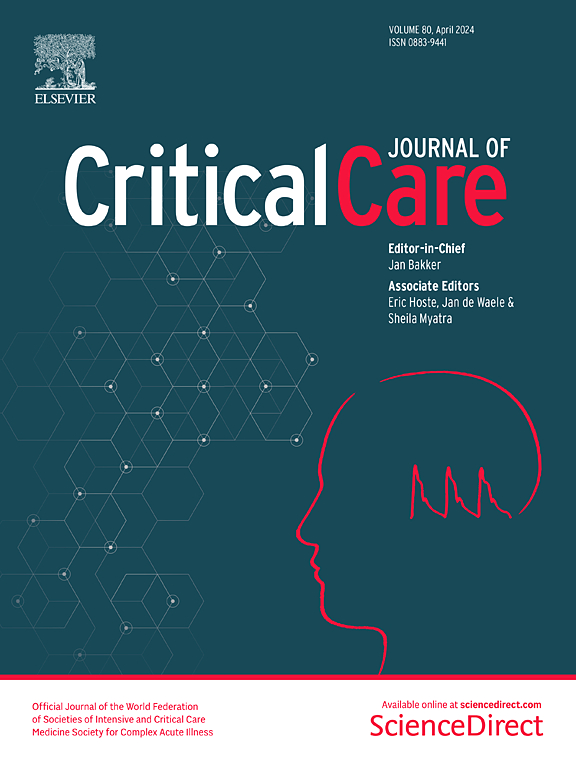Based -evidence, an intervention study to improve sleep quality in awake adult ICU patients: a prospective, single-blind, clustered controlled trial
IF 8.8
1区 医学
Q1 CRITICAL CARE MEDICINE
引用次数: 0
Abstract
Evidence-based guidelines advocate promoting sleep in intensive care unit (ICU) patients, yet many patients experience poor sleep quality. We sought to develop a collaborative evidence-based intervention with healthcare providers and assess whether evidence-based sleep interventions could improve sleep quality in awake adult ICU patients. We conducted a prospective, nonrandomized cluster control trial in two intensive care units (ICUs) at a tertiary general teaching hospital in China. Patients aged 18 years or older who stayed in the ICU for one night or more and were conscious were eligible for enrollment. We only blinded the patients, not the outcome assessors. On the basis of evidence-based practice and clinical reality, we developed intervention measures for the intervention group, which mainly included four aspects: reducing environmental noise in the ICU, adjusting nursing actions, modifying nighttime lighting, and other measures. The assessment tools used were wearable actigraphy sleep monitoring devices and the Richards-Campbell Sleep Questionnaire (RCSQ). The primary outcomes were patient sleep quality, including total sleep time, deep sleep time, light sleep time, rapid eye movement (REM) time, number of awakenings, overall sleep score, and patients' self-assessment of their sleep quality that night. The data collected were analyzed via SPSS and Mplus statistical software for between-group analysis, pre-post comparison, profile analysis, and calculation of the intervention effect size. From September 1, 2023, to January 31, 2024, 713 patients underwent eligibility assessment, and ultimately 246 patients were included in the analysis, with 125 in the intervention group and 121 in the control group. Comparative analysis revealed no statistically significant differences in sleep quality between the two groups when the duration in the ICU = 1 night (P > 0.05), with a small intervention effect size. However, the intervention group had higher sleep quality scores (sleep monitoring wristband: 57.74 ± 22.55 > 57.72 ± 19.39; RCSQ questionnaire: 60.58 ± 22.14 > 57.61 ± 24.4) and total sleep time (440.42 ± 262.11 > 420.31 ± 236.89), a lower awakening frequency (3.98 ± 2.69 < 6.09 ± 4.66) and a lower awakening frequency (3.976 ± 2.693 < 6.09 ± 4.664) than did the control group. The sleep quality of patients who stayed in the ICU for > 1 night significantly improved in all the parameters except rapid eye movement time (min) according to the pre-post-test analyses (P < 0.05), with a medium to large intervention effect size and favorable intervention effects. Evidence-based interventions significantly improve sleep quality in ICU patients hospitalized for more than one day. However, our results do not support the improvement of sleep quality in patients admitted to the ICU for one day. Clinical trial registration: ChiCTR2300075763, Registered 14 September 2023—Retrospectively registered, https://www.chictr.org.cn/bin/userProject基于证据,一项旨在改善清醒的重症监护病房成人患者睡眠质量的干预研究:前瞻性、单盲、分组对照试验
循证指南提倡促进重症监护病房(ICU)患者的睡眠,但许多患者的睡眠质量很差。我们试图与医疗服务提供者合作开发一种循证干预措施,并评估循证睡眠干预措施能否改善清醒的 ICU 成年患者的睡眠质量。我们在中国一家三级综合教学医院的两个重症监护病房(ICU)开展了一项前瞻性、非随机分组对照试验。年龄在 18 周岁或以上、在重症监护室住院一晚或以上且神志清醒的患者均符合报名条件。我们只对患者进行盲法评估,而不对结果评估者进行盲法评估。在循证实践和临床实际的基础上,我们为干预组制定了干预措施,主要包括四个方面:降低重症监护室环境噪声、调整护理操作、改变夜间照明和其他措施。使用的评估工具为可穿戴的动静脉睡眠监测设备和理查兹-坎贝尔睡眠问卷(RCSQ)。主要结果是患者的睡眠质量,包括总睡眠时间、深睡眠时间、浅睡眠时间、快速眼动(REM)时间、觉醒次数、总体睡眠评分以及患者对当晚睡眠质量的自我评估。收集到的数据通过 SPSS 和 Mplus 统计软件进行分析,包括组间分析、前后比较、概况分析和干预效果大小计算。从 2023 年 9 月 1 日至 2024 年 1 月 31 日,共有 713 名患者接受了资格评估,最终有 246 名患者被纳入分析,其中干预组 125 人,对照组 121 人。对比分析显示,当在重症监护室的时间=1晚时,两组患者的睡眠质量差异无统计学意义(P>0.05),干预效果较小。然而,干预组的睡眠质量得分更高(睡眠监测腕带:57.74 ± 22.55 > 57.72 ± 19.39;RCSQ 问卷:60.58 ± 22.14 > 60.58 ± 22.14 > 57.72 ± 19.39):60.58±22.14>57.61±24.4)和总睡眠时间(440.42±262.11>420.31±236.89),觉醒频率较低(3.98±2.69 1晚),根据前测-后测分析,除眼球快速运动时间(分钟)外,其他参数均有显著改善(P<0.05),干预效应大小为中到大,干预效果良好。循证干预能明显改善住院一天以上的重症监护室患者的睡眠质量。然而,我们的结果并不支持入住重症监护室一天的患者的睡眠质量得到改善。临床试验注册:ChiCTR2300075763,2023年9月14日注册-回顾性注册,https://www.chictr.org.cn/bin/userProject
本文章由计算机程序翻译,如有差异,请以英文原文为准。
求助全文
约1分钟内获得全文
求助全文
来源期刊

Critical Care
医学-危重病医学
CiteScore
20.60
自引率
3.30%
发文量
348
审稿时长
1.5 months
期刊介绍:
Critical Care is an esteemed international medical journal that undergoes a rigorous peer-review process to maintain its high quality standards. Its primary objective is to enhance the healthcare services offered to critically ill patients. To achieve this, the journal focuses on gathering, exchanging, disseminating, and endorsing evidence-based information that is highly relevant to intensivists. By doing so, Critical Care seeks to provide a thorough and inclusive examination of the intensive care field.
 求助内容:
求助内容: 应助结果提醒方式:
应助结果提醒方式:


